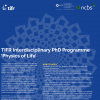The TIFR Interdisciplinary Programme in the Physics of Life (TIFR-PoL) targets exceptionally creative and adventurous students with strong foundations in physics, engineering and computer science, who seek to carry out cutting-edge theoretical and experimental research in biology.
The study of living systems presents some of the deepest and most challenging problems in all of science, including: the origin of life, the evolution of complexity, and the functioning of the brain. Each of these questions requires us to build connections between physics and chemistry at molecular scales, with outcomes at cellular, organismal and ecosystems scales. This is why, over the past decade, ideas from physics, engineering and computer science have become indispensable to biology.
The TIFR-PoL is a special stream within the TIFR graduate programme that provides unique flexibilities and resources for students with quantitative backgrounds. Foundational courses provide a rapid introduction to biological phenomenology at all scales, from molecules to organisms and ecosystems. Advanced courses spanning soft and active matter physics, informational and data sciences, and modern experimental methods, expand and strengthen quantitative skills. Students in the programme have the opportunity to work with participating faculty members and groups in ICTS and NCBS, to define and address research questions that expand our quantitative and conceptual understanding of living systems.
ELIGIBILITY
BS/BE/B Tech/ME/ M Tech/ MSc/MS degrees in Science or Engineering
HOW TO APPLY
Candidates in the TIFR-PoL Programme must attempt one of the following national tests.
-
TIFR GS Examination 2024 in Physics, Mathematics or Computer Science
-
JEST 2024: Top candidates from Physics, Mathematics or Computer Science
-
GATE: Top candidates from Physics, Mathematics, Computer Science, Chemical Engineering, Mechanical Engineering (with a rank valid in May 2024)
-
UGC-CSIR NET Physical Sciences and Mathematical Sciences - JRF-eligible (with a rank valid in May 2024)
Candidates do not need to have any background in biological areas. A strong background in one’s own subject and an interest in interdisciplinary life science research is all that is required.
Interested candidates appearing for the the TIFR GS exam must indicate they wish to be considered for the TIFR-PoL Programme. Based on their GS examination scores, candidates will be invited to submit a full online application. For the JEST and GATE streams, applications will nominally begin in Jan 2024.. Details of these admission procedures, including cutoffs and application dates, will be available on the program website.
The submission deadline of TIFR GS application is November 2, 2023.
ICTS and NCBS are committed to building an environment that is inclusive, non-discriminatory and welcoming of diverse individuals. We especially encourage the participation of women and other under-represented groups.
E-mail: gs@icts.res.in


